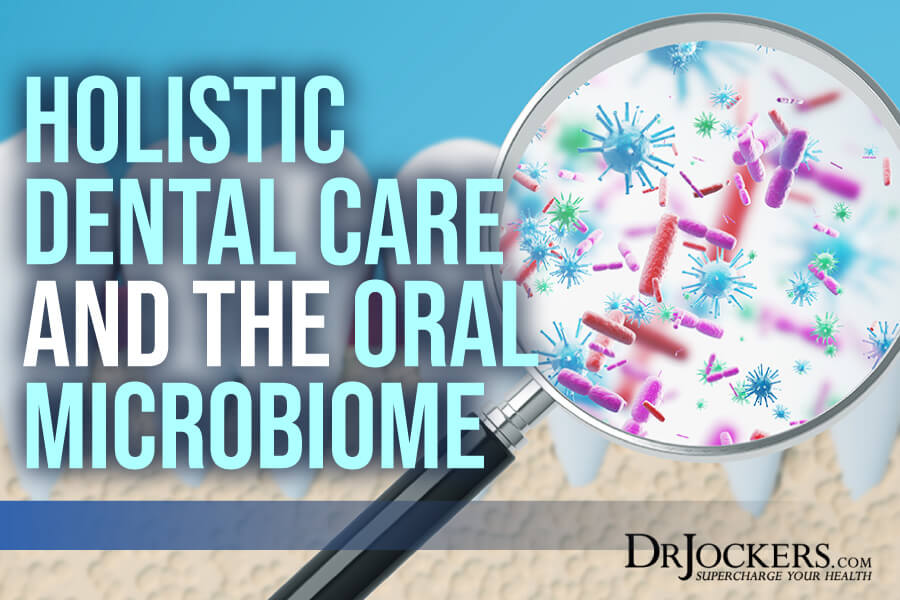 Holistic Dental Care and the Oral Microbiome
Holistic Dental Care and the Oral Microbiome
Your dental and oral health is part of your overall health. Your oral microbiome and dental health affect your entire body. If your oral microbiome is out of balance and you have dental health issues, it can affect your whole health and increase the risk of inflammation, symptoms, and disease.
Your dental care should be part of your overall healthcare. Holistic dental care is an alternative dental care option to traditional, modern-day dentistry. Holistic dental care approached dental and oral health from a holistic perspective. Holistic dental care providers take your nutrition, lifestyle, physical, mental, emotional, and spiritual health into consideration. Holistic dentists use safer strategies, including safer yet modern technology and toxin-free herbal care.
In this article, you will learn about holistic dental care. I will explain what holistic dental care is. I will discuss the importance of the oral microbiome. You will learn about the problems with modern dentistry. I will explain the main strategies holistic dentists use. I will also offer guidance on finding the best holistic dental care for you and your family.

What Is Holistic Dental Care
Holistic dental care or holistic dentistry is considered a form of alternative, complementary, and natural dental medicine and dental care. Holistic dental care may also be referred to as biological dental care, natural dental care, biocompatible dental care, integrative dental care, alternative dental care, unconventional dental care, or progressive dental care.
Holistic dental care serves as a more natural alternative to traditional dental care. It approaches dental care and oral health from a holistic perspective. Your body is a whole system, not just a sum of its parts. Everything affects everything.
Your diet, lifestyle, and overall health affects your dental and oral health, and your dental and oral health affects your whole body as well. Holistic dental care not only addresses your death, but your over physical, emotional, and spiritual health. Over the years, it has gained increasing popularity because of its holistic approach to dental care and the oral microbiome as a part of your overall health.
Holistic dental care and holistic dentistry are different from traditional dentistry in many ways. Traditional dental care and dentistry tend to focus on diagnosis and treatment of problem areas related to your teeth, gums, jaw, and areas of your head and neck that may be affected by your mouth.
Holistic dental care and dentistry, on the other hand, focuses on the whole body and the whole person as a physical, emotional, and spiritual being. Physical, including dental health issues, often stem from emotional or spiritual problems, and your physical, including your dental health, can greatly affect your emotional and spiritual well-being. Being aware of this connection is critical for your dental and overall health.
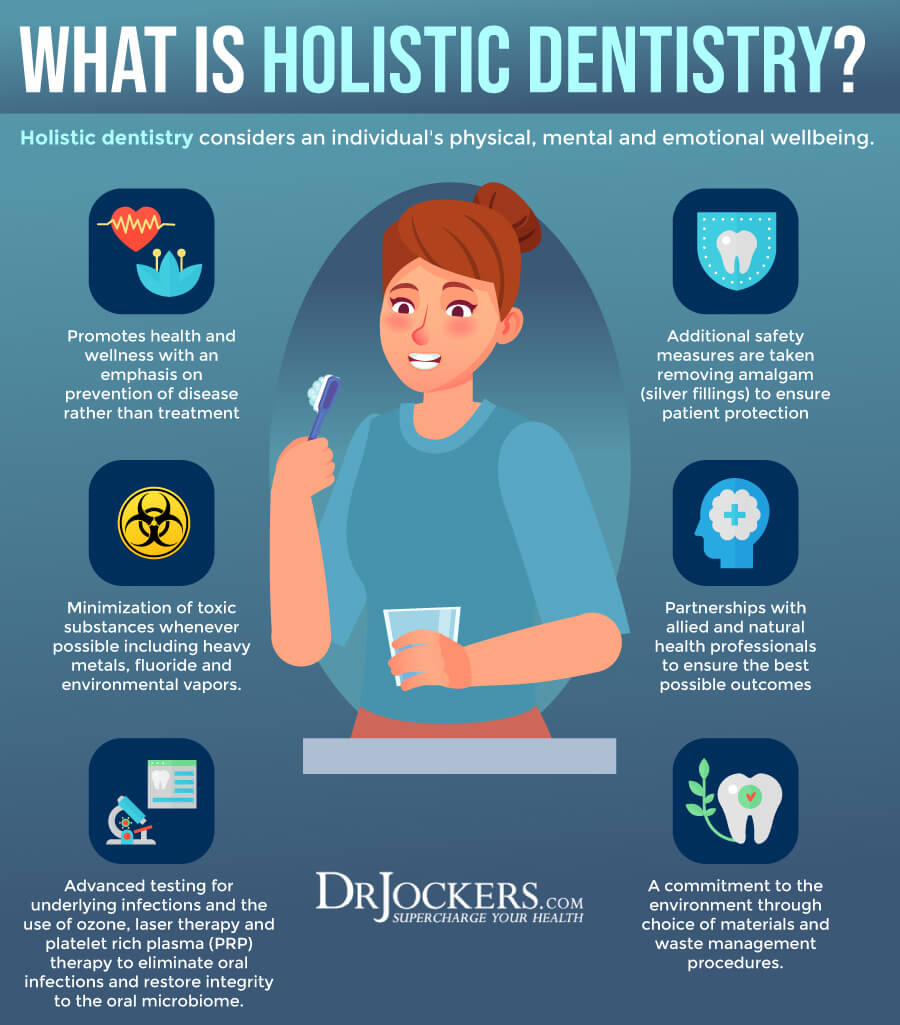
What to Expect with Holistic Dentistry:
Beyond its approach to dental care, holistic dentistry differs in its treatment methods as well. Traditional dental care mainly focuses on brushing, flossing, and filling. These are, of course, important: brushing and flossing are critical for prevention and care, and fillings are sometimes necessary to prevent further damage. But there is more to holistic dentistry.
Holistic dental care put s a great emphasis on the effects of nutrition on the oral microbiome and oral health. Alternative strategies that holistic dental clinics use may also include nutrition education, nutritional strategies, dietary supplementation and minimally invasive treatment options.
Holistic dental practices offer digital x-rays and other safer diagnostic alternatives to regular x-rays used at traditional dental clinics. This is important because getting a number of x-ray at your twice-a-year cleaning appointments and each time a problem arises, or you need a dental procedure exposes you to radiation. Radiation can increase your risk of cancer and other health issues.
Holistic dentists also don’t use amalgam fillings because of toxicity issues and opt for composite fillings instead. They also do not perform root canals because of safety issues and the chemicals involved. Unlike traditional dentists, they use biocompatible or natural materials.
Instead of a medicated mouthwash, they may offer a herbal mouthwash for gingivitis. Holistic dentists also advise against fluoride toothpaste. They may recommend herbal toothpaste, herbal tooth powder, neem toothpaste, propolis, or other herbal and natural options for dental care.
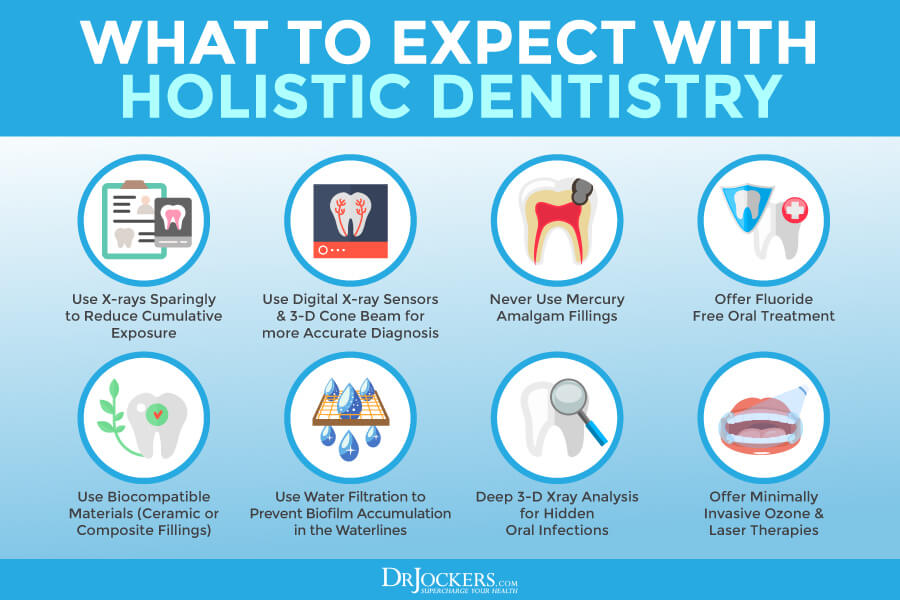
The Importance of the Oral Microbiome
The importance of your gut microbiome and gut flora balance is a topic that more and more people talk about. I have covered it on my website many times, and there are countless articles and videos on it online. But did you know that your mouth also has a microbiome? It’s called your oral microbiome.
Your oral microbiome is part of your entire human microbiome. The truth is that we are a composite of many species of bacteria and other microbes. We live in a symbiotic relationship with them. Many of them are healthy microbes we need. They help us to stay alive and thrive. Other bacteria and microbes are harmful to our health. These beneficial and harmful microbes need to stay in balance inside your body, including your oral cavity.
According to a 2018 study published in Protein Cell and a 2019 study published in the Journal of Oral and Maxillofacial Pathology, your oral microbiome is critical not only for your oral and dental health but also the health of your entire body (1, 2). For example, according to a 2019 study published in Food Science and Human Wellness, poor oral microbiome balance can be linked to oral diseases, obesity, diabetes, and cancer (3).
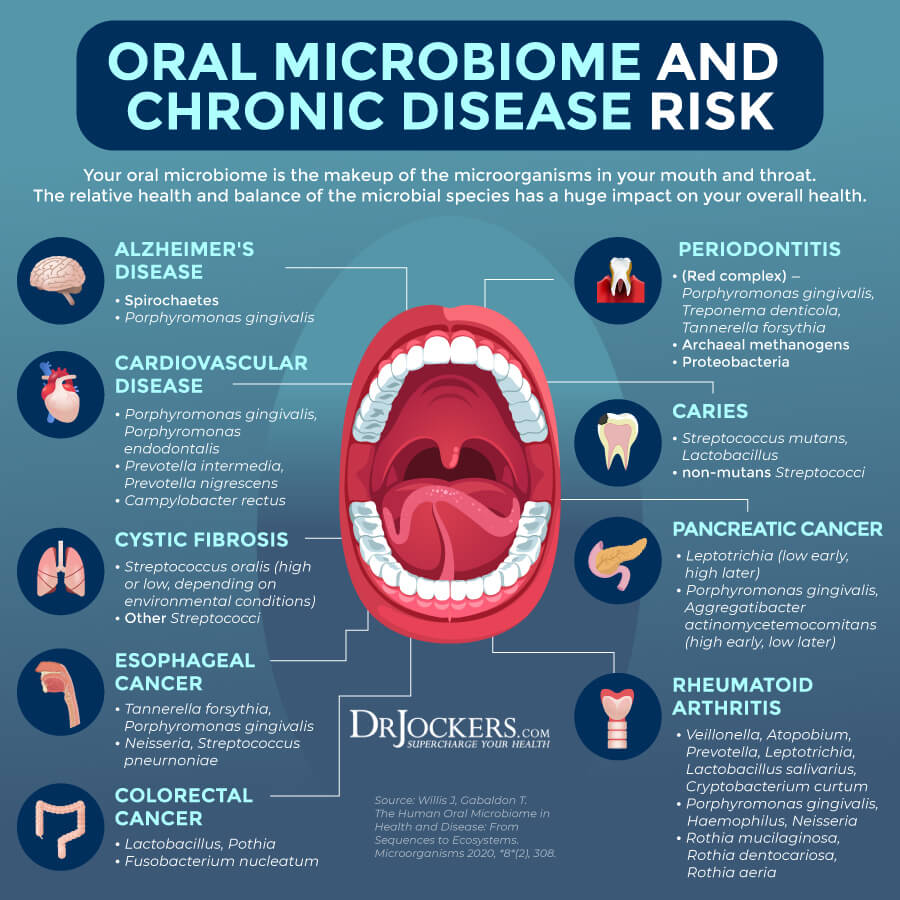
The Oral Microbiome and Chronic Disease
Your mouth is the home of a unique community of bacterial organisms. Beneficial bacteria in your mouth help to carry ionic minerals from your saliva to your teeth. They help remineralization. They transport molecular oxygen to your gums. They help to reduce waste and free radical damage. They also help to protect you from harmful bacteria and other environmental harm and infections.
On the other hand, there are harmful bacteria and, in some cases, yeast and other pathogens, that can harm your oral health. When there are too many of these bad microbes in your mouth, it will disrupt the microbial homeostasis and oral microbiome balance. Plaques are one of the first signs of an oral microbiome balance.
Your oral microbiome mostly consists of aerobic bacteria that need oxygen to live. A well-oxygenated, healthy, and balanced environment offers a thin, clear, and protective layer of biofilm, allowing a clean feel to your teeth and healthy pink gums.
In an imbalanced environment, however, this biofilm will turn into a thick, sticky, and smelly layer that overtimes turns into plaque. Beyond plaques, other signs of an oral microbiome imbalance include tooth decay, cavities, gum disease, pain, bleeding gums, and bad breath.
Oral microbiome imbalance may develop from poor dental hygiene, following a diet high in refined sugar and carbohydrates, a low pH in the mouth, and chronic stress. Good dental care, including flossing and brushing, following a healthy, low-sugar diet, and reducing stress.
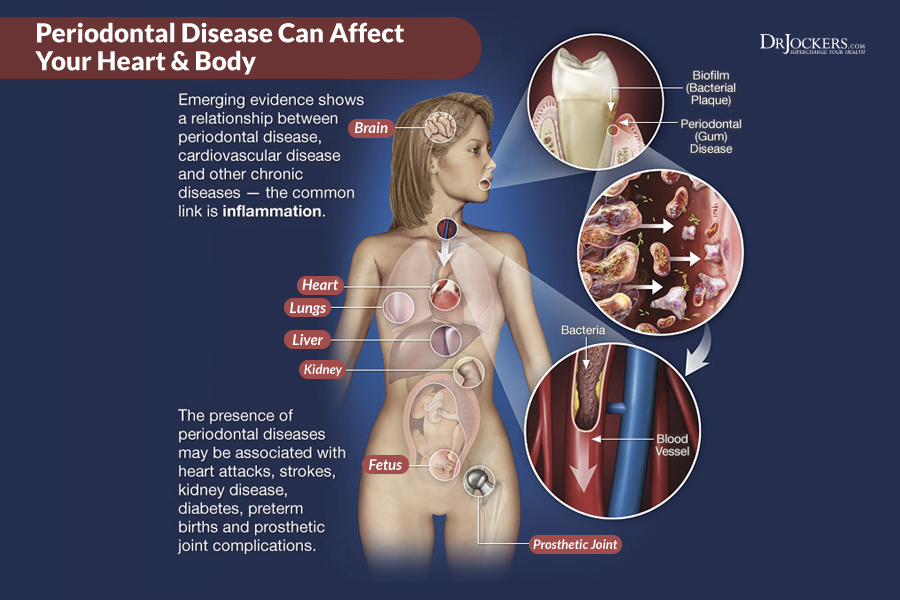
Problems with Modern Dentistry
There are a number of problems with modern dentistry that you need to be aware of. Chances are, they are enough to change your mind and choose holistic dental care instead.
Amalgam/Silver Fillings
Getting fillings is a common dental procedure. What about amalgam or silver fillings though? Dental amalgam has been used as a dental filling for over 150 years around the world. It is a mix of liquid (elemental) mercury and powdered alloy created by silver, copper, and tin. Elemental mercury is responsible for over half of the weight of amalgam fillings and helps to bind the other particles together.
Even though the American Dental Association claims that dental amalgam fillings are safe, and they are low-cost and durable, there are a list of problems with them (4). The first thing that may come to your mind is aesthetics. Sure, dental amalgam fillings are not exactly aesthetically pleasing. But this should be the least of your worries. You should stay away from them even if they are used in a less visible area.
These dental amalgam silver fillings can be incredibly dangerous to your health. Every time you chew, a small amount of mercury will escape from your filling and get released into your body. Drinking hot tea, coffee, or other liquids or eating hot foods will also encourage the escape of mercury vapors from your silver filling.
Mercury toxicity is a real problem, even if it’s a lower grade but long-term, chronic exposure. According to a 2012 study published in the Toxicology International, amalgam fillings can cause hypersensitivity in certain individuals (4). According to the United States Environmental Protection Agency (EPA), mercury toxicity can lead to a list of health issues, including headaches, migraines, insomnia, fatigue, tremors, nerve damage, respiratory problems, respiratory failure, and kidney problems (5).
Amalgam fillings may increase your risk of headaches, migraines, brain fog, fatigue, fibromyalgia-like symptoms, chronic pain, digestive issues, and other chronic symptoms and health issues. According to a 2011 study published in the Journal of Oral Rehabilitation, removing amalgam silver fillings can improve both oral and general health and symptoms (6). Here is a helpful article with more info on dental amalgams.
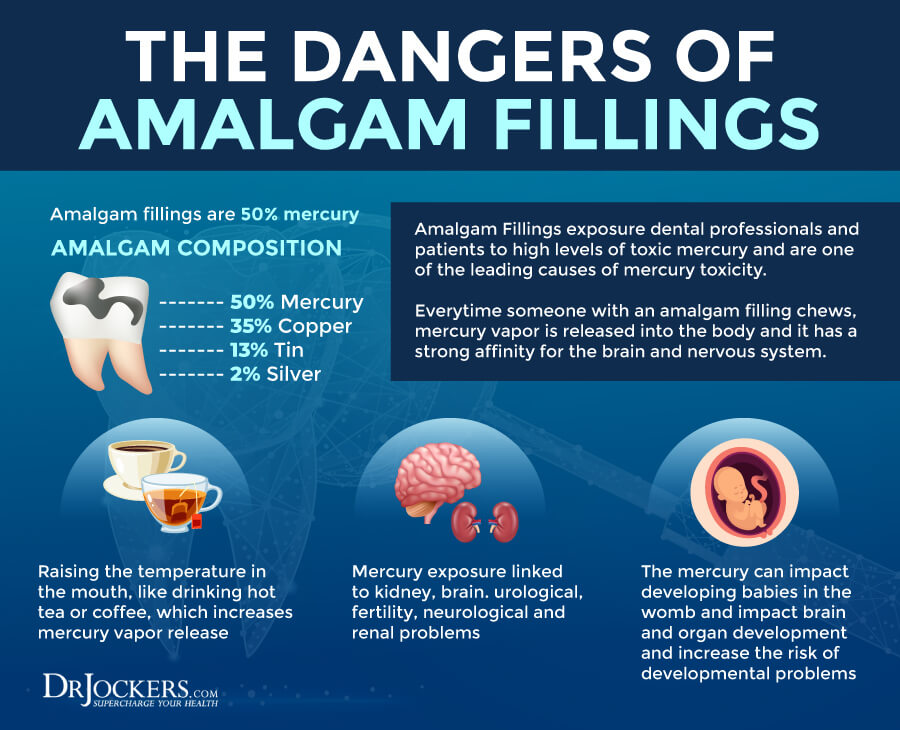
The Use of Fluoride
Fluoride is commonly found in our soil, water, and foods. Traditional dentistry tends to claim that it helps to reduce the risk of cavities which lead to increased fluoride in our dental care products and water. Fluoride is commonly used in conventional toothpaste and dental care products.
It is also found in our municipal tap water. Fluoride treatments are also commonly offered at traditional dental clinics. If you have any cavities or dental problems, your dentists may even prescribe prescription fluoride toothpaste to remineralize your teeth and reduce your risk of cavities. The problem is that you may be doing way more damage than good by using fluoride.
High fluoride exposure may increase your risk of cognitive problems. A 1995 study published in Neurotoxicity and Teratology has found that prenatal fluoride exposure can increase the risk of hyperactivity and cognitive problems (7).
A 2017 study published in Environmental Health Perspectives has also linked it to lower IQ levels (8). Other research, including a 1998 study published in Brain Research and a 1997 study published in the Annals of the New York Academy of Sciences has found that fluoride, aluminum, and sodium in water may increase the risk of dementia and Alzheimer’s disease. (9, 10).
Fluoride may also increase the risk of cancer. A 1977 study published in Fluoride and a 1993 study published in the Journal of the International Society of Fluoride have both linked fluoride exposure to an increased risk of cancer (11, 12).
Fluoride may also increase the risk of hormonal health issues and diabetes. A 2015observational study published in the Journal of Epidemiology and Community Health has found that fluoride in drinking water may increase the risk of hypothyroidism (13).
A 1997 paper at the University of Surrey, School of Biological Sciences has found that fluoride may affect the pineal gland and puberty (14). A 2015 study published in the Journal of Diabetes Research has found that low-level fluoride in water may help insulin sensitivity suggesting that higher levels may contribute to insulin resistance and the risk of diabetes (15).
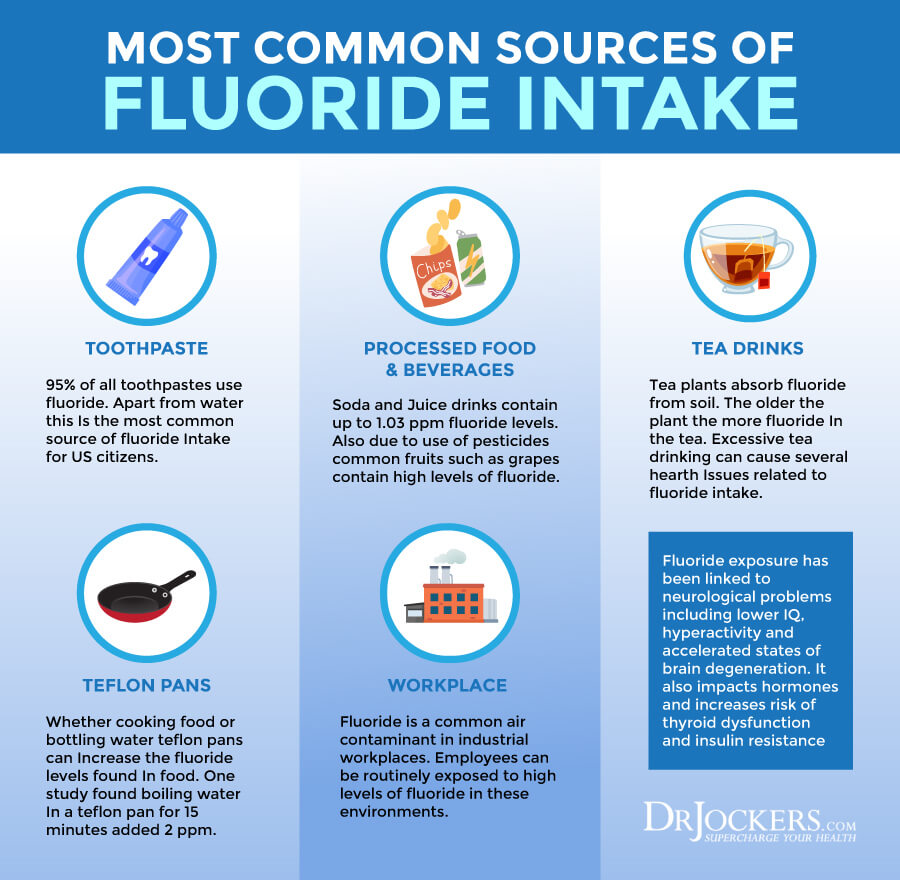
Root Canals
Root canals are often recommended for individuals who are experiencing pain from a tooth and when the cavity is too deep for a regular filling or there is a deep crack close to or hitting the gum line causing an infection, damage, tooth erosion, gum disease, or other inflammatory risks.
The goal is to alleviate pain and ‘save’ the tooth by avoiding an extraction. During this procedure, your dentist removes the soft center of the tooth called the pulp. The pulp is made up of nerves, blood vessels, and connective tissue that allow your tooth to grow and thrive. After a root canal, the tooth is usually capped with a crown to avoid the risk of cracking and further damage.
Root canal treatments have been around for hundreds of years. Around the 1900s, many doctors and dentists believed that root canals can increase the risk of future health complications and trigger chronic diseases or sepsis.
However, with the advancements of x-rays and other modern diagnostic tools, modern-day dentistry deemed root canal treatments safe. According to the ADA, root canals are safe and are commonly used in traditional dentistry (16, 17, 18).
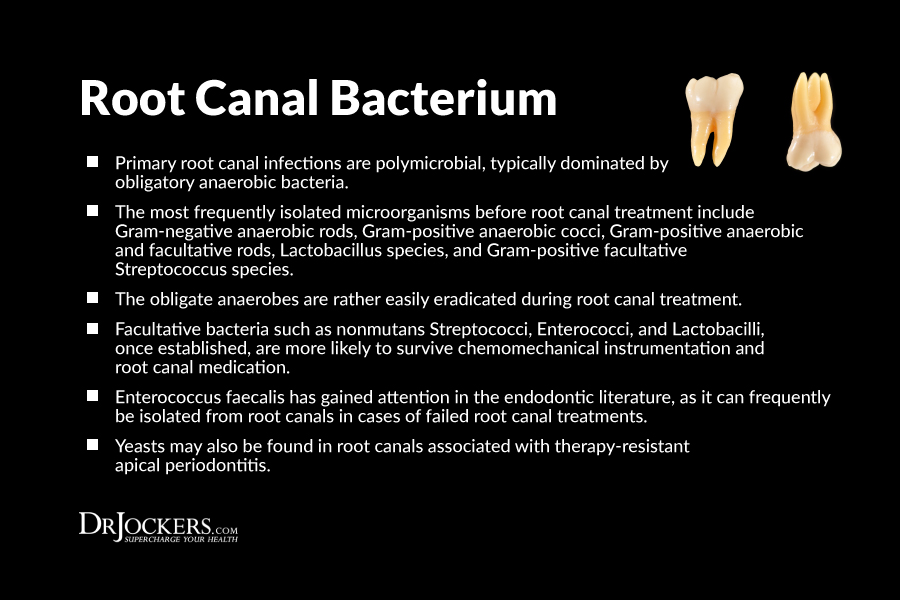
However, there are a lot of problems with root canals. There is always a risk of human error. There are also technological limitations, including instrumental breakage, imperfect seals, toxic fillings, and limited detection of infection, inflammation, and disease. There are also sanitation problems as it’s impossible to kill all pathogens inside the tooth. As a 2008 study published in the International Endodontic Journal has shown bacteria can reside in teeth that received a root canal even in asymptomatic patients (19).
Root canals can also lead to secondary infections and harbor pathogens. Under perfect circumstances, the root canal is perfectly sealed, the blood supply is completely removed from the tooth, an oxygen-free environment is created where aerobic bacteria can’t survive. The problem is that any anaerobic bacteria left behind during treatment can not only survive, but thrive here.
According to a 2015 study published in Molecular Oral Microbiology, these bacteria are also called inflammophilic because they love inflammation (20). They can secrete endotoxins to your body increasing vascular permeability and increasing your risk of disease.
A 2015 study published in Virulence has found that root canals can result in asymptomatic, chronic, and systemic inflammation that can lead to serious health problems (21). A 2000 review published in Clinical Microbiology Reviews has found that oral infections can increase the list of chronic diseases, including arthritis, peptic ulcer, inflammatory bowel disease, and more (22).
Another issue is treating root canal-related infections with antibiotics. Regular antibiotics treatment can increase antibiotic- and drug resistance and further feed microbiome imbalance. You can learn more about the real problems with root canals by reading this article.
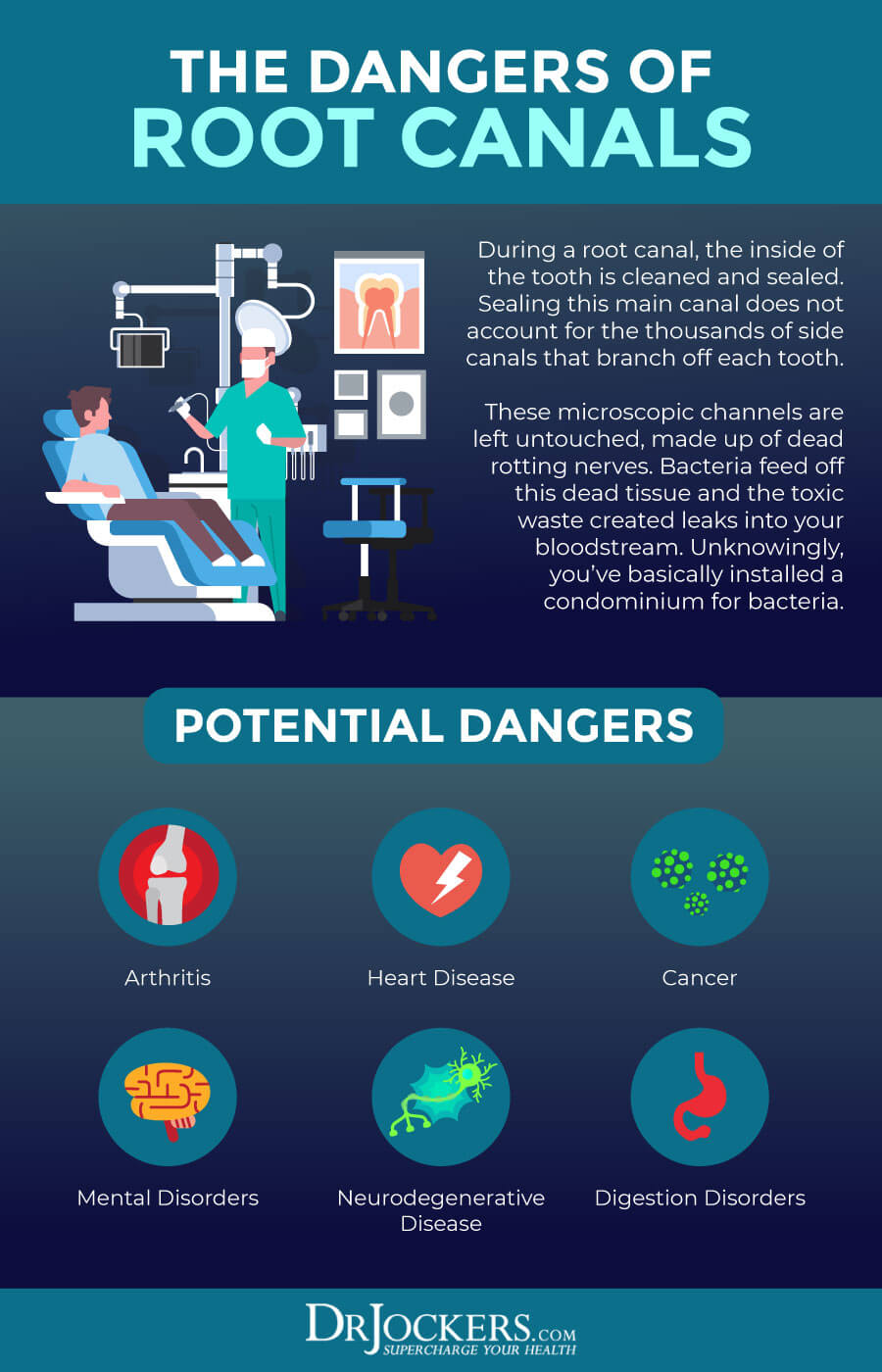
The Development of Cavitations
The development of cavitations is another risk of modern dentistry. Cavitation is a hole in the bone that can develop when the tooth has been extracted but this hole in the bone hasn’t healed properly or hasn’t been filled.
When your tooth is removed, your body usually fills the space in the bone over time. However, when the periodontal membrane is left behind after the extraction, the healing is usually incomplete leaving a spongy space or a hole in your jaw bone.
While many dentists can see cavitations on an x-ray indicated by a shadow of a tooth or phantom tooth image, they usually don’t see it as a problem. However, cavitations can present a serious issue.
Inside cavitations, anaerobic bacteria can thrive, and toxins can hide. Because of this, cavitations may increase your risk of chronic inflammation, chronic fatigue, chronic pain, digestion problems, and other chronic health issues.
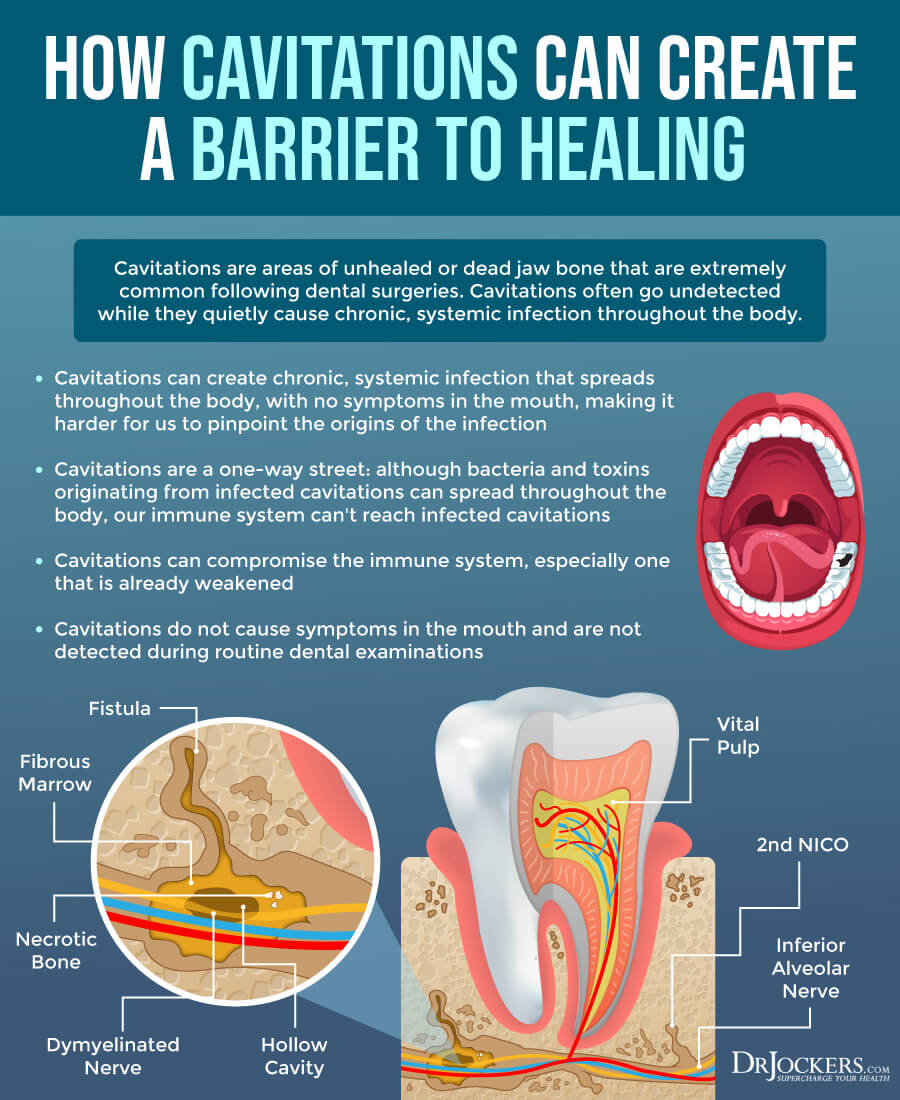
Strategies Used in Holistic Dental Care
Understanding the problems with modern dentistry, I recommend that you choose holistic dental care over traditional dental care. They use much safer techniques that can help to improve your dental, oral, and overall health. Here are the main strategies used in holistic dental care:
Safe Mercury Removal Techniques
Removing amalgam fillings safely is critical. Going to a traditional dentist can be problematic. They may just drill the filling out, which allows tiny mercury-filled particles to fly around your mouth. This may increase the risk of toxicity and long-term health issues. Holistic dentists, on the other hand, are able to take them out safely.
Holistic dentists use the Safe Mercury Amalgam Removal Technique (SMART) protocol to safely remove any silver dental fillings you may have. Holistic dentists use an amalgam separator to collect mercury amalgam waste and prevent it from releasing from the dental clinic. They have a high-volume air filtration system in place, such as an oral aerosol vacuum, to remove any amalgam particles and mercury vapor that may be generated during the removal of the filling.
The dentists and dental personnel wear protective gowns and covers, non-latex gloves, face shields, and hair coverings to avoid the spread of mercury particles from patient to dentist and to avoid infections. Patients are protected with a full-body impermeable barrier and a non-latex dental dam around the tooth. Dentists use a saliva ejector under the dental dam and an oral aerosol vacuum to lower mercury exposure. Holistic dentists make sure that they remove all amalgam dental fillings in the largest chunks possible and remove them completely.
Holistic dentists recommend charcoal, chlorella, or other similar natural absorbents for both rinsing and to be taken orally before the removal of the filling to reduce toxicity. They use the same after the procedure to eliminate the chance of toxicity. They may also use ozonated water. Your holistic dental clinic will also recommend a post-procedure protocol to detox from mercury naturally, including using activated charcoal and chlorella.
Non-Fluoride-Based Dental Care
Holistic dental care uses non-fluoride-based dental care. This includes fluoride free tooth paste and tooth products. In addition, many holistic dentists recommend the use of oral water irrigation with a hydro floss irrigator.
It is a highly effective magnetized water oral irrigation device that can clean your teeth sparkly clean. A 1998 study published in the Journal of Clinical Periodontology has found that using hydro floss is effective for plaques, gingivitis, and calculus (23). In fact, the research showed that it can inhibit plaque 64 percent more effectively than other irrigators.
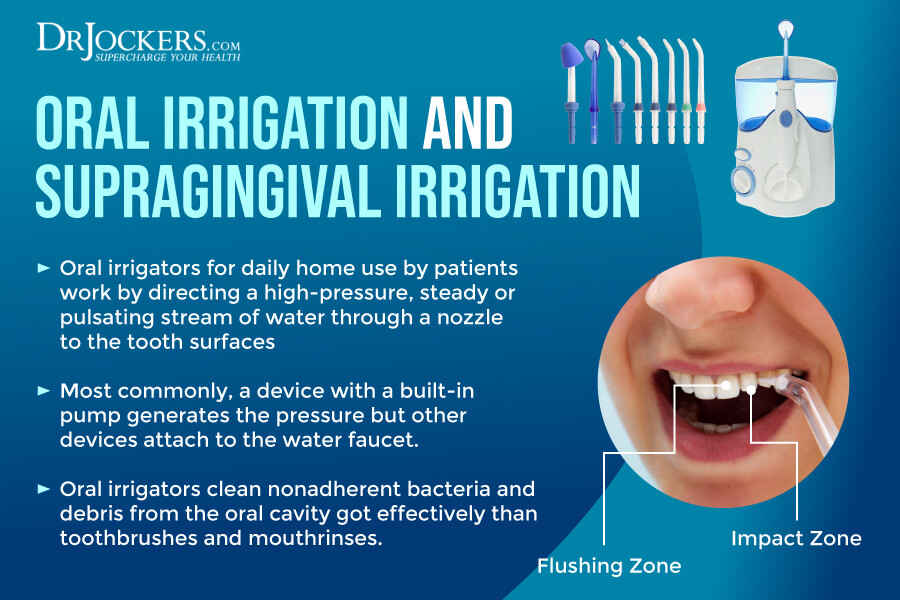
Oil Pulling
Another effective natural strategy for non-fluoride holistic dental care is oil pulling with coconut oil. Oil pulling helps to reduce bad microbes, inflammation, and the risk of infections and helps to ‘pull’ out toxins from your oral cavity. I recommend that you practice oil pulling every morning. Squish a tablespoon of coconut oil in your mouth for about 20 minutes.
This is a great time for meditation, reflection, journaling, or grounding. Spit it out and brush your teeth carefully. I recommend using a different toothbrush after oil pulling than other times of the day as you are brushing away toxins.
Certain essential oils, like clove oil, peppermint, and spearmint offer antimicrobial and anti-inflammatory benefits that can reduce infections in your mouth. They are a great ingredient for natural, homemade mouthwash mixed with water. Remember, these three natural strategies are holistic dental care practices and natural preventative strategies that you can and should use daily at home.
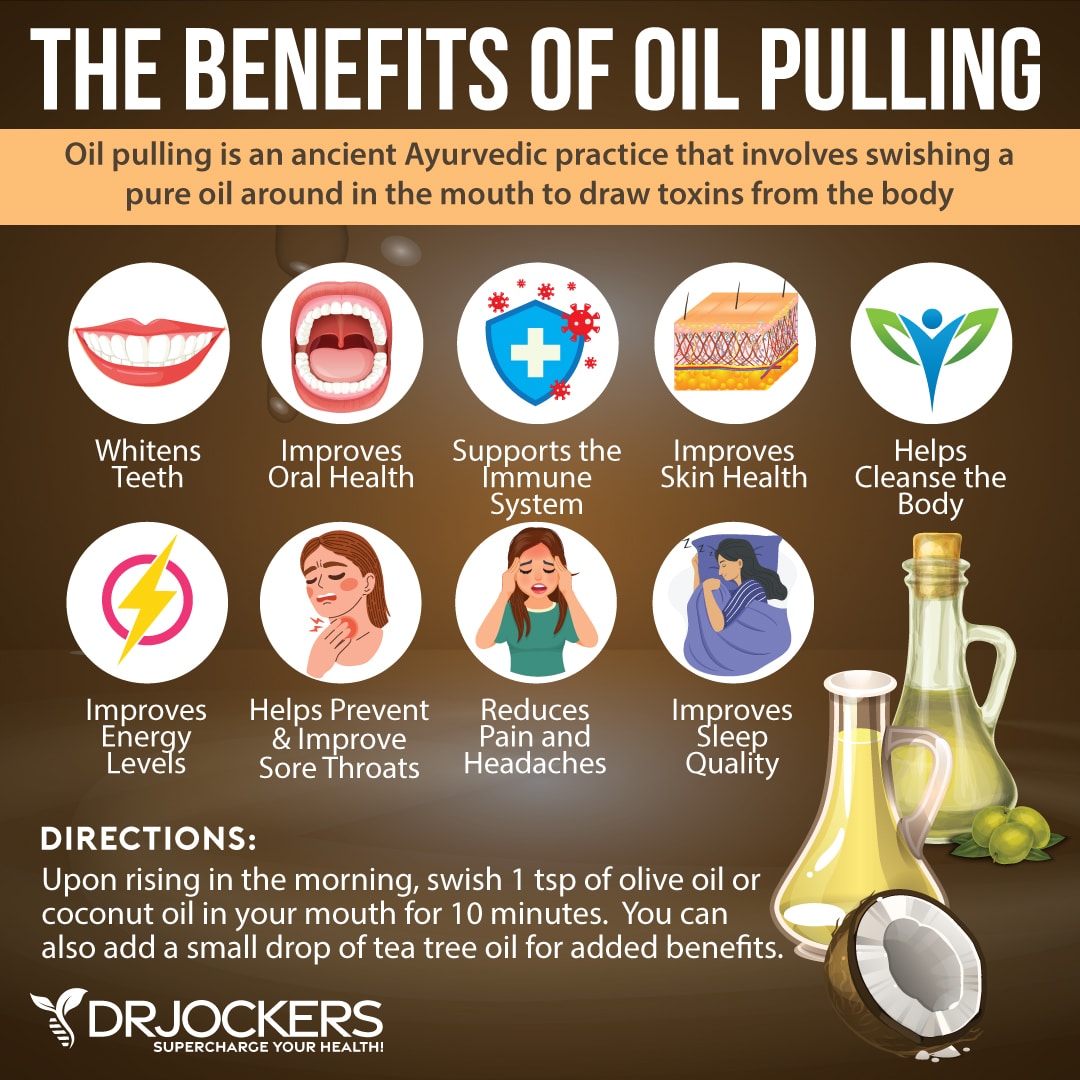
Advanced Diagnostic Tools
Holistic dentists use 3D CT scans, or Cone Beam Analysis as a diagnostic tool. The Cone Beam Analysis is a computed tomography (CT) scan that takes detailed images of your teeth, the bones around your teeth, soft tissue, and nerve pathways in one single scan.
It is more sufficient and offers more information than regular dental or facial x-rays that may not detect all problems. Not to mention that this strategy avoids the use of endless x-rays (24).
Dental Ozone Therapy
Holistic dentists also offer dental ozone therapy to reduce bacteria, pathogens, and infections. If you are dealing with tooth decay, dental ozone therapy can disinfect your entire mouth during your dental procedure to reduce the risk of further issues.
A 2013 study published in the Open Journal of Stomatology has found that dental ozone therapy can reduce deterioration in periodontal disease (25). A 2014 review published in Interventional Neuroradiology and a 2019 review published in Medical Gas Research has also found that ozone therapy is beneficial in dental and oral medicine (26, 27).
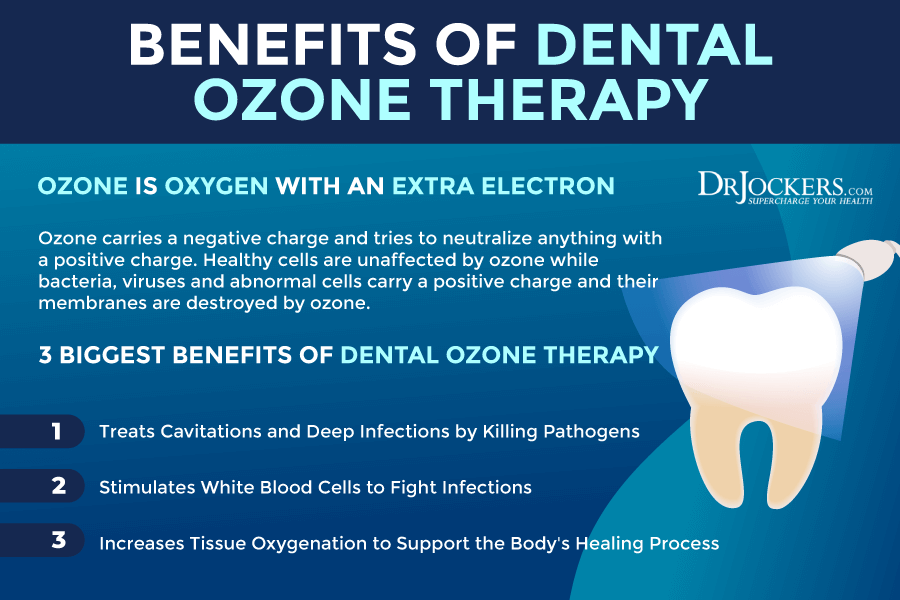
Advanced Laser Therapy
Holistic dentists also use advanced laser therapy. According to a 2012 study published in the National Journal of Maxillofacial Surgery, advanced laser therapy is a safe and innovative tool in dentistry (28). Laser may be used for prevention, treatment, restoration, growth modulation, wound healing, and dentinal hypersensitivity in holistic dental care.
Advanced laser therapy can help to cut both hard and soft tissue easier than traditional strategies. This technique is safe and causes less pain and discomfort. You will require no shots and feel no pain. There is less harm to your soft tissues. Using this strategy, there is less risk of bleeding, swelling, cracked tooth, discomfort, and sensitivity. You won’t require any drilling. Your visit will take less time and your recovery will be much quicker.
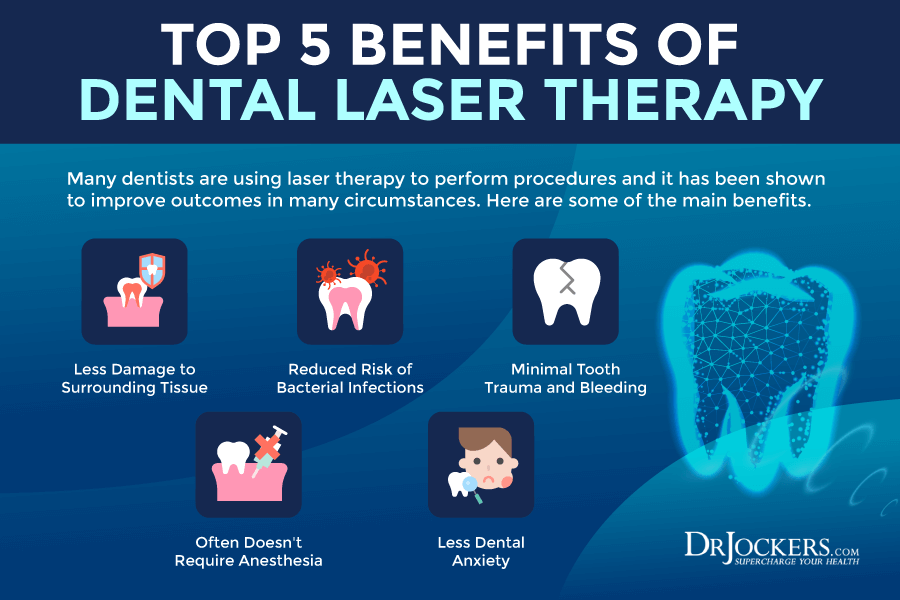
Platelet-Rich Fibrin Therapy
Platelet-rich fibrin therapy (PRF) may be used for cavitations in holistic dental care. Platelet-rich fibrin therapy can reduce the risk of infections, lower inflammation, and accelerate healing after dental surgery, such as wisdom teeth or other teeth extraction.
A 2017 study published in the European Journal of Dentistry has found that using platelet-rich fibrin can reduce pain, improve wound healing, and reduce the risk of dry sockets (29). A 2018 randomized clinical trial published in the Nigerian Journal of Clinical Practice has found that platelet-rich fibrin therapy can reduce pain levels, periodontal probing depth, and dry sockets after molar extraction (30).
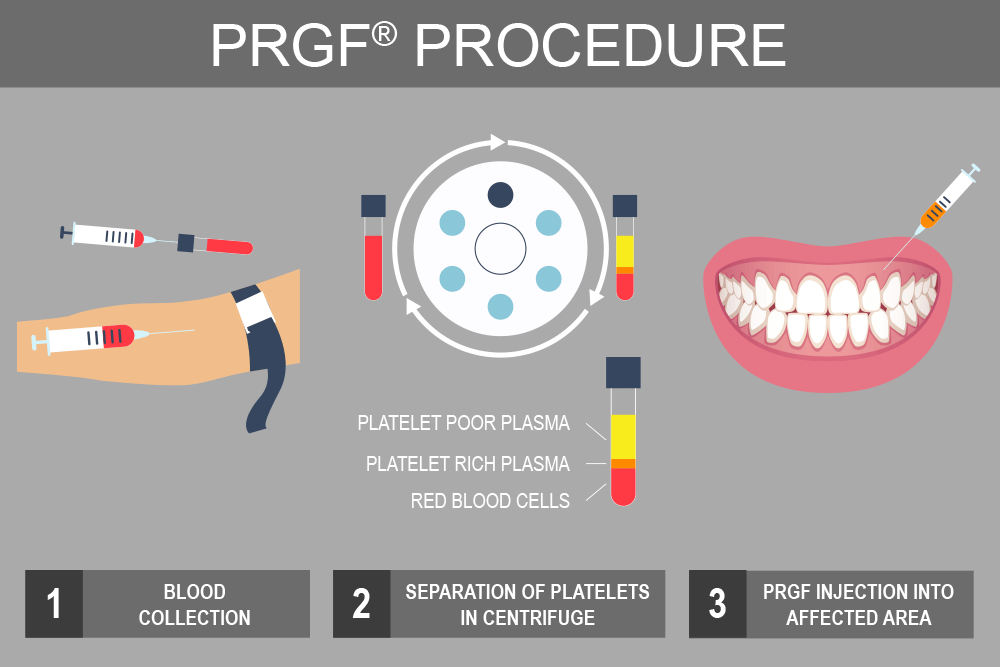
Where to Find a Holistic Dentist
I recommend that you choose holistic dentistry for your dental care. To find a holistic dentist, I recommend that you check out the website of The International Academy of Oral Medicine and Toxicology. You can look for accredited providers in holistic dentistry and check out the extra training they have received.
It’s worth noting that while everyone on the site is accredited for safe mercury removal techniques, not all of them are as well trained in other techniques. Make sure to look at the profile of each provider in your area thoroughly to make the best choice for you.
I recommend that you call the holistic dental clinic and make an appointment for an initial consultation. This will allow you to ask any questions and to make sure that you are comfortable with your dentist and dental clinic before any procedures or serious financial commitment.
Holistic Dental Care at Home
· Support a healthy oral biome, strong teeth & gums.
· Boost your immunity and detoxify your body.
· Lower your long-term oral care costs.
· Help the planet — with truly sustainable packaging, carbon neutral shipping, etc.
It’s everything you need for optimal oral care and well-being — and nothing you don’t. No gimmicks, odd chemicals, cheap fillers, or superficial ingredients (e.g. sweeteners, glycerine, flavorings, etc)
The system features:
-
Mineral Toothpowder – Supercharged with nourishing clays, trace minerals & fulvic acid. No plastic + refillable system.
-
Infused Black Floss – Clinically proven to remove up to 40% more plaque than typical flosses.
-
Bamboo Toothbrushes – Effectively & gently cleans under the gumline to avoid gum loss with innovative design
-
Fulvic Mineral Complex – Helps feed teeth from within and aids in whole-body health.
-
Oil Pulling Mouthwash – Certified organic, cold-pressed, unrefined oils help nourish & detoxify your mouth and gums.
-
Tongue Cleaner – Simple, powerful stainless steel tool that helps get rid of bad breath.
Plus Akamai is both a B Corporation and 1% for The Planet Member.
Final Thoughts
Your dental and oral health is part of your overall health. Your oral microbiome and dental health affect your entire body. If your oral microbiome is out of balance and you have dental health issues, it can affect your whole health and increase the risk of inflammation, symptoms, and disease. Holistic dental care approached dental and oral health from a holistic perspective.
Holistic dental care uses safer strategies, including safer yet modern technology, toxin-free herbal care, detoxification strategies, and nutrition and lifestyle recommendations. I recommend that you choose a qualified holistic dentist for your dental care.
If you want to work with a functional health coach, I recommend this article with tips on how to find a great coach. Our website offers long-distance functional health coaching programs with our world-class team of health coaches. For further support with your health and other goals, just reach out—our fantastic coaches are here to support your journey.
Inflammation Crushing Ebundle
The Inflammation Crushing Ebundle is designed to help you improve your brain, liver, immune system and discover the healing strategies, foods and recipes to burn fat, reduce inflammation and Thrive in Life!
As a doctor of natural medicine, I have spent the past 20 years studying the best healing strategies and worked with hundreds of coaching clients, helping them overcome chronic health conditions and optimize their overall health.
In our Inflammation Crushing Ebundle, I have put together my very best strategies to reduce inflammation and optimize your healing potential. Take a look at what you will get inside these valuable guides below!
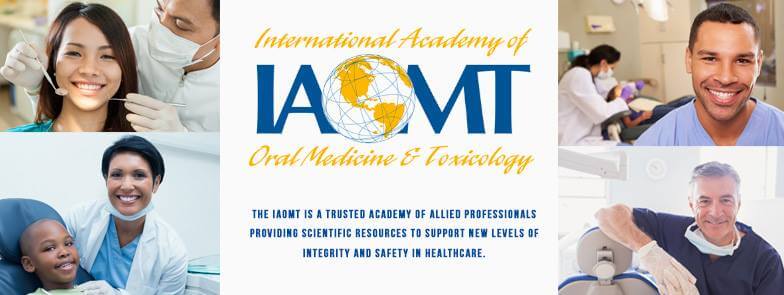
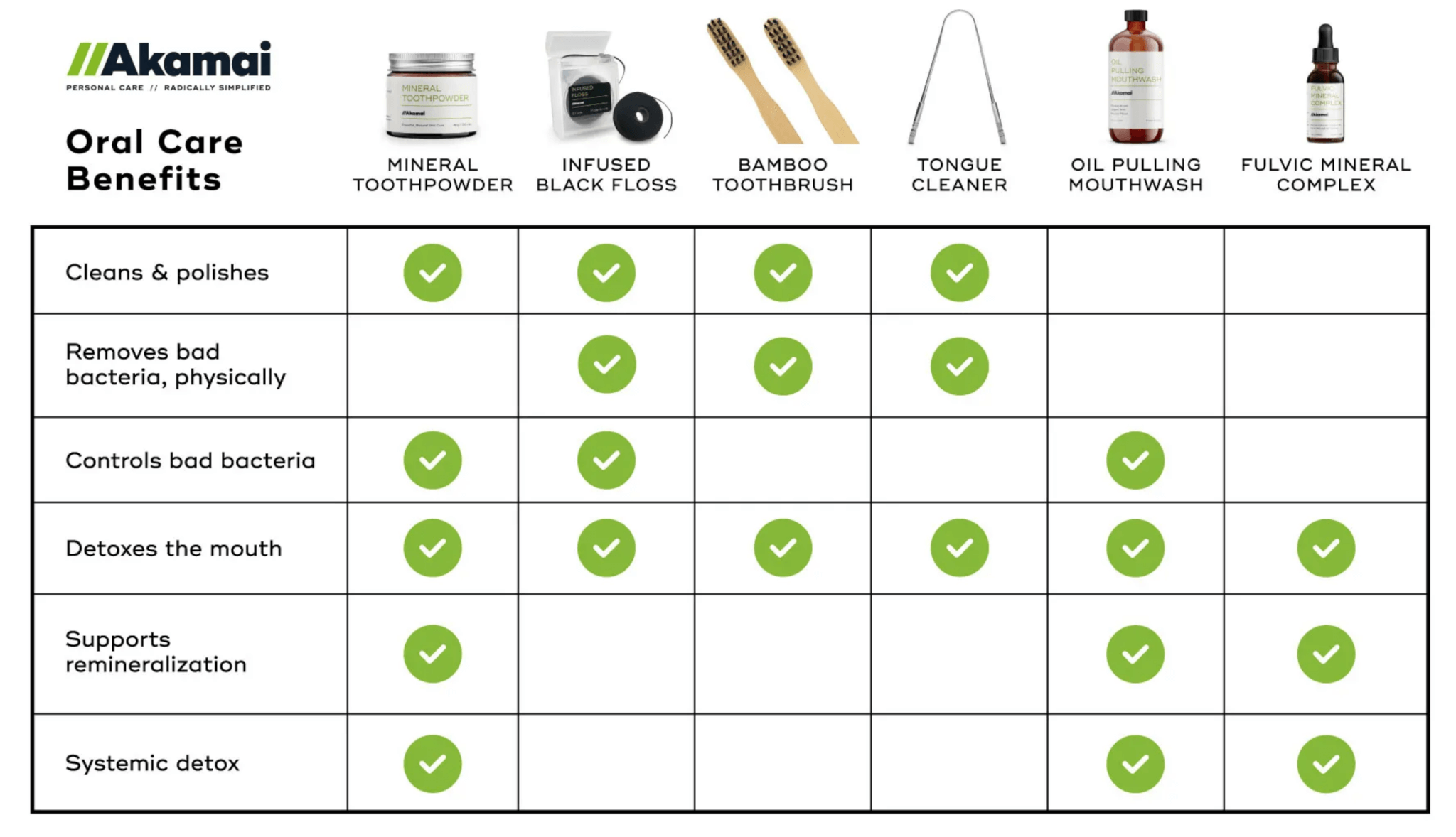




Thank you for the great information! What are your thoughts on dental sealants for children? What about braces, is metal absorption a potential issue?
Thanks again!
Yes it can be an issue.
What do you recommend for missing teeth? Are implants safe or should I get partial bridge instead? What to do if a molar needs to be removed, but it is in between other teeth? My dentist wants to do an implant, but I do not like the idea of drilling into my jaw and placing a metal screw/rod into it! Then, of course, dentures and bridges contain heavy metals, plastics, etc. Please advise, and thank you for your time. I’m also resisting the fluoride treatments and haven’t used fluoride toothpaste in 15 years and the discoloration of my teeth is gone! Dentists thought I had periodontal disease because of it! Smh!
Hello Joanne – I would recommend consulting with a holistic dentist on these options.
You talk about “bad” oral bacteria. Is there such a thing as “good” oral bacteria just as there good colonic bacteria? If so, are there probiotic bacteria for our mouths or even oral microbiome transplantation?
There are dental probiotics buy you need to search hard to find them. They seem to be effective (in my very limited experience).
Yes absolutely there are good oral bacteria and there are oral probiotic products you can find on the market as well!
I was wondering if you have brochures with your fact images in this article available? It would be such a great educational tool for patients.